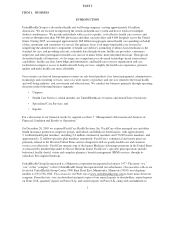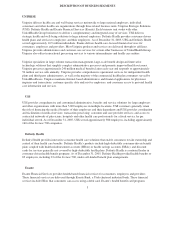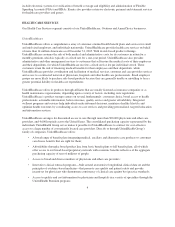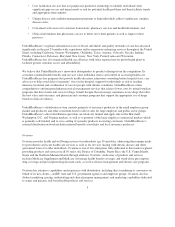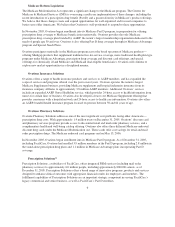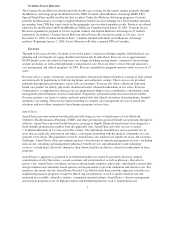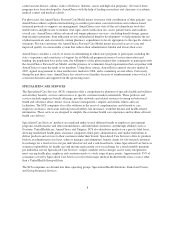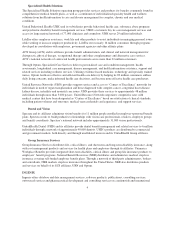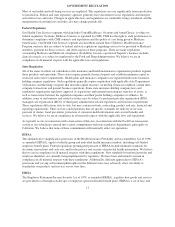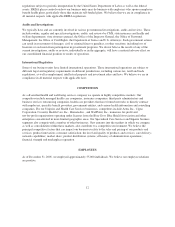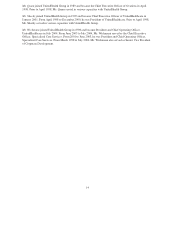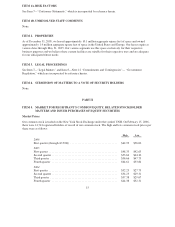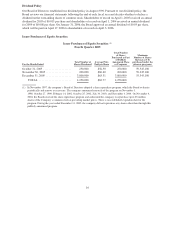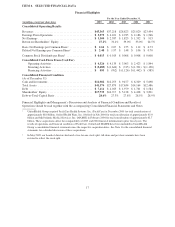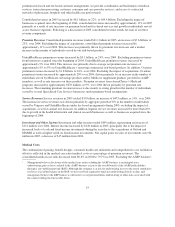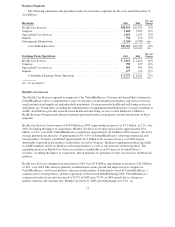United Healthcare 2005 Annual Report Download - page 13
Download and view the complete annual report
Please find page 13 of the 2005 United Healthcare annual report below. You can navigate through the pages in the report by either clicking on the pages listed below, or by using the keyword search tool below to find specific information within the annual report.GOVERNMENT REGULATION
Most of our health and well-being services are regulated. This regulation can vary significantly from jurisdiction
to jurisdiction. Federal and state regulatory agencies generally have discretion to issue regulations and interpret
and enforce laws and rules. Changes in applicable laws and regulations are continually being considered, and the
interpretation of existing laws and rules also may change periodically.
Federal Regulation
Our Health Care Services segment, which includes UnitedHealthcare, Ovations and AmeriChoice, is subject to
federal regulation. Ovations’ Medicare business is regulated by CMS. CMS has the right to audit performance to
determine compliance with CMS contracts and regulations and the quality of care being given to Medicare
beneficiaries. Our Health Care Services segment also has Medicaid and State Children’s Health Insurance
Program contracts that are subject to federal and state regulations regarding services to be provided to Medicaid
enrollees, payment for those services, and other aspects of these programs. There are many regulations
surrounding Medicare and Medicaid compliance. In addition, because a portion of Ingenix’s business includes
clinical research, it is subject to regulation by the Food and Drug Administration. We believe we are in
compliance in all material respects with the applicable laws and regulations.
State Regulation
All of the states in which our subsidiaries offer insurance and health maintenance organization products regulate
those products and operations. These states require periodic financial reports and establish minimum capital or
restricted cash reserve requirements. Health plans and insurance companies are regulated under state insurance
holding company regulations. Such regulations generally require registration with applicable state Departments
of Insurance and the filing of reports that describe capital structure, ownership, financial condition, certain inter-
company transactions and general business operations. Some state insurance holding company laws and
regulations require prior regulatory approval of acquisitions and material intercompany transfers of assets, as
well as transactions between the regulated companies and their parent holding companies or affiliates. In
addition, some of our business and related activities may be subject to preferred provider organization (PPO),
managed care organization (MCO) or third-party administrator-related regulations and licensure requirements.
These regulations differ from state to state, but may contain network, contracting, product and rate, financial and
reporting requirements. There are laws and regulations that set specific standards for delivery of services,
payment of claims, fraud prevention, protection of consumer health information and covered benefits and
services. We believe we are in compliance in all material respects with the applicable laws and regulations.
As typically occurs in connection with a transaction of this size, in connection with the PacifiCare transaction,
certain of our subsidiaries entered into various commitments with state regulatory departments, principally in
California. We believe that none of these commitments will materially affect our operations.
HIPAA
The administrative simplification provisions of the Health Insurance Portability and Accountability Act of 1996,
as amended (HIPAA), apply to both the group and individual health insurance markets, including self-funded
employee benefit plans. Federal regulations promulgated pursuant to HIPAA include minimum standards for
electronic transactions and code sets, and for the privacy and security of protected health information. We believe
that we are in compliance in all material respects with these regulations. New standards for national provider and
employer identifiers are currently being implemented by regulators. We have been and intend to remain in
compliance in all material respects with these regulations. Additionally, different approaches to HIPAA’s
provisions and varying enforcement philosophies in the different states may adversely affect our ability to
standardize our products and services across state lines.
ERISA
The Employee Retirement Income Security Act of 1974, as amended (ERISA), regulates how goods and services
are provided to or through certain types of employer-sponsored health benefit plans. ERISA is a set of laws and
11


